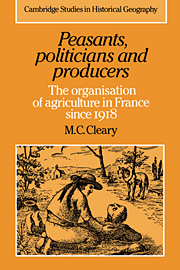Book contents
- Frontmatter
- Contents
- List of figures
- List of tables
- Preface
- Abbreviations
- Base map of the départements of France
- Introduction
- 1 The transformation of rural France
- 2 Individuals and associations in the farming community
- 3 Agricultural associations before 1914
- 4 The heyday of the regional unions, 1918–1930
- 5 The economic crisis and the rise of corporatism, 1930–1940
- 6 Agricultural associations under Vichy, 1940–1944
- 7 A rural revolution? Syndicates and cooperatives, 1944–1965
- 8 The deceptions of progress, 1965–1985
- 9 Representing the community – the place of salaried labour and women
- 10 Conclusion
- Notes
- Bibliography
- Index
5 - The economic crisis and the rise of corporatism, 1930–1940
Published online by Cambridge University Press: 28 October 2009
- Frontmatter
- Contents
- List of figures
- List of tables
- Preface
- Abbreviations
- Base map of the départements of France
- Introduction
- 1 The transformation of rural France
- 2 Individuals and associations in the farming community
- 3 Agricultural associations before 1914
- 4 The heyday of the regional unions, 1918–1930
- 5 The economic crisis and the rise of corporatism, 1930–1940
- 6 Agricultural associations under Vichy, 1940–1944
- 7 A rural revolution? Syndicates and cooperatives, 1944–1965
- 8 The deceptions of progress, 1965–1985
- 9 Representing the community – the place of salaried labour and women
- 10 Conclusion
- Notes
- Bibliography
- Index
Summary
‘Before the Depression, the peasantry was for the most part passive, inarticulate, atomized. Since the Depression, the peasantry has become increasingly active, vocal, organised.’ This judgement by Wright highlights how important this period was in creating an ‘authentic’ peasant voice in the countryside. The steady promotion of the peasantry into the organisations of the rural world, the increasing recourse to peasantist doctrines and ideology and the return of a sense of pride in being part of the ‘peasant community’ have all been regarded as outcomes of the economic and political events of this decade. Such a view should not, however, be allowed to obscure the fact that these developments were rooted in the agrarian movements of earlier decades. What was new was the sheer number of groups now vying for peasant support.
The range of such groups was remarkable. The quasi-fascist ‘Greenshirts’ of Henri Dorgères, the conservative Parti agraire, the traditional syndicalism of the rue d'Athènes, the communist Confédération des paysans travailleurs or the socialist Confédération nationale paysanne all sought to seduce the electorally powerful agricultural population of some 4½ million (or 32 per cent of the economically active population of France). Political gain, economic cooperation, price support for the farming community and moral conformity were advanced as arguments for peasant enrolment in the varied agricultural groups of this period.
The world economic depression underpinned this organisational ferment. Agricultural prices fell by some 50 per cent between 1930 and 1935, and agricultural purchasing power fell by over a quarter in that same period.
- Type
- Chapter
- Information
- Peasants, Politicians and ProducersThe Organisation of Agriculture in France since 1918, pp. 71 - 91Publisher: Cambridge University PressPrint publication year: 1989



